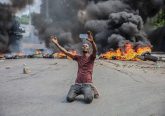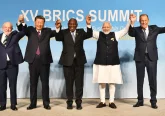
In a recent interview with Emine Taskiran, a journalist with Zaman, a Turkish newspaper, I responded to queries about the coup in Mali and the destruction of ancient shrines in Timbuktu . The situation is very fluid and receives little attention in the British press. It is best covered by Le Monde and All Africa. Emine Taskiran’s interview is reposted here with the kind permission of Zaman.
Emine Taskiran: What is the structure of government in Mali? And what is the relation between the government and militant groups?
David Anderson: The coup in Mali earlier this year removed an elected government, one of the longest standing democratic governments in Africa if you measure it simply by their length of time in office. But Mali’s elected government contained many former military officers, and the truth is that the army have been the main force in Mali politics since independence from France in the 1960s.
The army is small but reasonably well trained – they have enjoyed the support of the Americans over recent years, and a majority of their senior officers have had training in the USA or alongside US units in West Africa. Rebel militia have operated in northern Mali for many years, however, mostly located amongst the Tuareg communities of the northern desert. The army has never succeeded in suppressing this rebellion, sand it has flared up whenever additional resources become available – more arms – or the weakness of the government in Bamako presents opportunities that can be exploited. At present both factors have come together.
The Mali army contains many northerners, and concerns have been expressed about the loyalty of some of its units if they were to be deployed against the rebels. But, for the most part, the senior military command comprises better educated southerners.
Emine Taskiran: How is the atmosphere in Mali after the military coup that took place earlier this year? Particularly the changes going on with the government.
David Anderson: I can only describe the current situation as very tense. They original plotters have been challenged by a counter-coup, and even those forces thought to be loyal to the elected government have now joined in the unrest making demands of their own. The transitional government seems to have little effective authority. If effect, there is no longer a civilian government of any kind: the military are competing amongst themselves for the right to rule Mali, and that right will be won by force of arms.
Emine Taskiran: Do you think the transitional government is making progress?
David Anderson: No. Army factions now call the shots – in every possible sense. The rule of law has broken down, and large swathes of the north, including all of the principal towns, not least the historic centres of Gao and Timbuktu, are in rebel hands.
Emine Taskiran: The transitional government is seen as unsuccessful and the control over the country’s security has been lost. Now a military intervention is being sought. Would such an intervention simmer the problems or would it lead to a civil war?
David Anderson: ECOWAS – West Africa’s regional body – is considering an intervention, and increasingly Mali’s neighbours are becoming concerned that the disorder will spill over the borders. There is pressure to act, but regional resources are limited and some countries would prefer a UN intervention rather than one led by ECOWAS. It is difficult to see that a regional solution to this can be found, so some kind of wider international response is going to be necessary. The rebellion itself is more fragile than it may seem, and a concerted and coordinated military response might quickly see the rebel militias retreat from the strongholds they have seized. So, an intervention might speedily restore a semblance of order, but it would not end the problem. So long as their remains a broader Tuareg demand for secession, then this problem is not going to go away.
Emine Taskiran: What is the aim of the militant group Ansar Dine and what are they fighting against?
David Anderson: They are one of several factions supporting the rebellion against the government in Bamako. Some groups have only Tuareg goals in mind, and these are essential political. These factions have been supported by factions in neighbouring Mauritania over many years and they present themselves as spokespersons for the rebellion. Others, including Ansar Dine, have wider aims to assert a more conventional Islamic authority in the north. They see Tuareg hegemony merely as a vehicle for their own religious aims. Ansar Dine are also believed to have links with Al Queda in the Mahgreb, and it has been widely reported that salafist jihadists are among their ranks. This may well be the case, but we should also understand that there is a long tradition of mercenary militia activity in this region and, for the most part, fighting is material rather than ideological: the men with guns go to the highest bidder. This was given a fresh impetius by the collapse of Libya last year and the flight of many Tuareg who had fought with Gadaffi’s armies back to the Sahel. And they came armed to the teeth, having first looted Libya’s many desert armouries. It is this, more than any other factor, that explains the intensity of the current crisis.
Emine Taskiran: Is there a long-lasting reason behind the attacks to Timbuktu? Why did the organisation choose UNESCO World Heritage Site as their first point of attack?

David Anderson: Over the past two weeks we have learned about the attacks on heritage sites in Timbuktu, and also at the ancient capital of Gao. Many of the places that have been attacked and destroyed are ancient shrines housed in the mosques of these cities, many of them dating back to the fourteenth and fifteenth centuries. These shrines are venerated by local Muslims, although there has always been a debate within Islam in west Africa about the place of shrines and saints in religious observance. In that sense, the desecration of these sites might be thought of as part of a deeper and longer-riunnig conflict over the practice if Islam in the Sahel. This is how Ansar Dine present themselves – as restoring a proper Islamic faith and removing the sin of idolatory.
In addition, it is important to remember that these sites represent a connection with the West and the wider world through the recognition that has been given by UNESCO in its designation of the World Heritage mark. Timbuktu and its mosques can thus be presented as a symbol of Western influence in the region, as an entry point for tourism and for American capitalism and imperialism to enter the region and pollute its Islamic practices. This rather simplistic political interpretation appears to also have driven the assault on the tombs and shrines.
My sense is that the vast majority of Muslims in West African will be appalled by what has happened – by the intolerance it displays, and by the horrific damage done to historical and cultural sites, as well as religious places.
Emine Taskiran: What is the stance taken by the international organisations’, such as UNESCO, in the recent attacks?
David Anderson: There is little that an under-funded agency such as UNESCO can do when confronted by such actions. UNESCO, like all other UN agencies, depends upon the support and compliance of member states in order to do its work. The government of Mali accepted the designation of World Heritage at Timbuktu, and they are its guardians, not UNESCO. UNESCO has led the protests and taken steps to publicise what is happening, but beyond that they simply do not have the resources or political influence to do anything else.
Emine Taskiran: What is the real problem and what could be a solution?
David Anderson: Two key problems must be tackled. First, legitimate, non-military but effective government must be restored in Bamako. Without this no possible solution can be devised. Leadership to this end must come from within Mali – it cannot be imposed by outside intervention, no matter how friendly or well-intended that intervention might be. The Mali military must be persuaded to return to its barracks, and instead of fighting its own people turn its attention to restoring order and the rule of law in the troubled north. But this does not look like happening anytime soon, and we may be entering a protracted period when Mali will be ranked as a failed state, with all of the problems that suggests.
Second, the north has to be demilitarised. In this, Mali’s regional neighbours may have a role to play. The rebellion must be settled, whether by negotiation or by force. Splits among the rebels now make it more likely that a settlement of some kind can be made with the Taureg secessionists, and this might then isolate the salafist jihadists. That would be a good first step. After that, it is to be hoped that the Malian army can restore order, but it seems more likely that an international force of some kind may be needed to keep the peace.
Neither of these issues is easy to resolve. I think we are in for a long period of trouble and concern in Mali, which in turn will means destabilization and trouble for the Sahel as a whole.
David Anderson is Professor of African Politics and a Fellow of St Cross College. He regularly contributes commentary on African affairs to the print and broadcast media, and has recently appeared on BBC News, BBC World Television News, Al Jazeera, ITN, and Sky News, amongst others.







No Comment